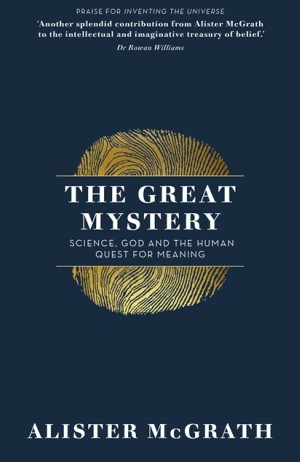The Great Mystery By Alister McGrath
McGrath addresses the perennial human quest for meaning, and with a couple of provisoes has produced a wonderfully enriching book
 The Great Mystery: science, God and the ultimate quest for meaning
The Great Mystery: science, God and the ultimate quest for meaning
By Alister McGrath
Hodder & Stoughton
ISBN: 9781473634312
Reviewed by: Rosa Hunt
In this book, Alister McGrath addresses the perennial human quest for meaning. It could be said that the book is a sustained criticism of what McGrath terms the “myth of progress”. Crudely put, this is the idea that humans are naturally good and can gradually make the world a better place through ever increasing knowledge, and ever decreasing reliance on myths such as religion.
At heart, the book is an apologia for the Christian narrative, with McGrath arguing convincingly that the problem of sin is one which throws a spoke into the “myth of progress”. In so doing, McGrath takes us through an intriguing and breath-taking whistle-stop tour of so many great thinkers and writers: Banville, Niebuhr, Kundera, Wolf, Thoreau, Chesterton, Plato, Polanyi, Einstein, the Medawars, Rushdie, Midgley, Freud, Hawking, Crick, Augustine, Pope … and that has not even got us to the end of chapter three!
So to some extent this is a book whose battle is fought in the citations - McGrath does not have the space to expand on his arguments, and left me wanting to read more of the works he cited in order to gain a deeper understanding. I felt that I had to take him on trust a little too often, but then again, I think that this is a book aimed at a ‘popular’ market and so perhaps I am expecting too much of it.
I also felt uneasy that McGrath’s interpretation of what it meant to be “made in the image of God” fell short of asserting the fundamental goodness of humanity, and it seemed to be on this axiom that his argument turned.
Having mentioned those two provisos, it must be said that this is a wonderfully enriching book, drawing on a vast range of both secular and Christian resources to explore questions of human meaning and destiny. I particularly liked McGrath’s conclusion, in which he suggests three basic virtues which we need to employ on our quest for meaning: humility (reality is a lot bigger than we are), generosity (we will have to learn to live with unresolved questions) and wonder (a willingness to expand our vision).
I very much enjoyed reading the book, and would particularly recommend it to those who desire a better understanding of where the Christian metanarrative fits into the wider thought world which we inhabit.
Rosa Hunt is minister of Salem Baptist Chapel in Tonteg, South Wales, and part-time tutor with South Wales Baptist College
Baptist Times, 29/09/2017